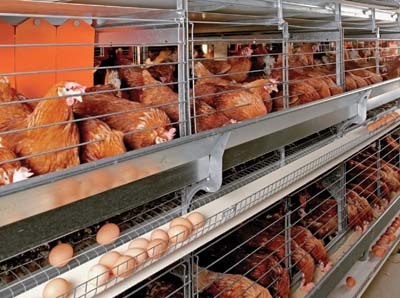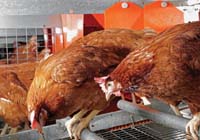
Proactive Policy
Kristy Nudds
Features Business & Policy Farm Business Alternative poultry housingManitoba Egg Farmers adopt Five Freedoms
The Manitoba Egg Farmers (MEF) surprised the rest of the poultry industry by becoming the first provincial egg marketing board in Canada to address alternative hen housing.
The Manitoba Egg Farmers (MEF) surprised the rest of the poultry industry by becoming the first provincial egg marketing board in Canada to address alternative hen housing. The organization announced a new animal care policy at its annual meeting, held March 10 in Winnipeg.
 |
| Freedom to Move. Enriched cages offer perches, nesting and scratching areas, which meet behavioural needs of hens and allow greater movement. Photo courtesy of Big Dutchman. Advertisement
|
This policy, according to the MEF, ensures that egg farmers in the province who build new facilities or undertake a major retrofit after 2018 must install a housing system that supports the Five Freedoms as laid out in United Kingdom’s Brambell Report on farm animal welfare, originally published in 1965 (see sidebar).
According to the policy, farmers have the option to build new facilities equipped with enriched cages or build another type of alternative housing system, as long as it supports the Five Freedoms.
The policy was developed in an effort “to be proactive and lead change, rather than waiting for it to be imposed on us,” says MEF general manager Penny Kelly.
She says the policy has been five months in the making, while the underlying strategy has been in the works for years. “At MEF we devote a lot of our time to long-term strategic planning, and animal care has topped the list for the last five to six years now.” Part of the planning process has been to do a thorough “scan” of what’s going on in the world and following the animal rights debate as it pertains to egg production.
The Five Freedoms
|
The MEF saw what was happening in Europe and how cages were being phased out, but “we thought, surely, this will never happen in North America. Then the next thing you know, it was on our doorstep with Proposition 2 in California,” she says.
Like other egg producers, the MEF faced a conundrum – how to get ahead of the animal rights issue. “The issue is really polarized,” says Kelly. “On the one side you have farmers wanting cages, on the other, activists who want them eliminated.”
So the MEF took a hard look at what was really at the heart of the welfare issue: the well-being of laying hens. “If we focus on caring for the hen, we knew that there was a middle ground and that systems exist to provide proper welfare standards for the hens,” she says. To determine what standards and principals for welfare to use as a guideline, the MEF found that the Five Freedoms were the most cited and followed by researchers, veterinarians and poultry specialists.
The organization has an animal care committee, the majority of whose members are outside of the MEF. The committee includes Dr. Bill Guenter, Professor Emeritus, University of Manitoba; Carl Radimer, a communications specialist; Dr. Dale Douma, a Manitoba government veterinarian who specializes in animal welfare; Dr. Lorne Cruise, a poultry veterinarian, two egg farmers and MEF staff. Kelly says a “eureka” moment occurred when the committee was discussing housing systems and Dr. Guenter noted that if the egg industry wanted to continue using cages, enriched cages were the direction the organization needed to go in future. Enriched cages combine the food safety benefits of conventional cages with the welfare benefits of open housing.
To start being proactive about advances in housing systems and the care of laying hens, the organization made enriched cages part of its organization’s strategy. A step forward was the introduction of three new entrants, each of whom received 6,000 quota units in a draw last fall, must have enriched cages in place in order to produce eggs.
The actual animal care policy, says Kelly, was about “setting a tone, and setting a direction. It’s saying to the public, egg farmers in Manitoba are progressive and receptive to change, and their commitment to the well-being of their laying hens is demonstrated through responsible actions.”
“Agricultural groups need to be in synch with society”, she says. “I think we have a huge challenge in the agricultural community, and that is understanding how society’s values have shifted.” Research suggests “farmers” are highly trusted by the general public, but if you scratch beneath the surface, this doesn’t necessarily mean that the public likes farm practices, or what a farm looks like.
“It doesn’t take much to have that trust upset. I think we run a risk in the agricultural community by patting ourselves on the back thinking everything is fine just because the public likes us,” she says. “We need to be conscious of shifting values, and figure out how to align ourselves with those values.”
One shifting value is emotion. Kelly says that although agriculture has good, credible scientific and economic evidence to show that current farming practices are sound, what can’t be forgotten is the emotional connection the public has with animals and the food they eat.
 |
|
| Photo courtesy of Big Dutchman.
|
This connection is highlighted in a press release from the Winnipeg Humane Society (WHS), in which its executive director Bill McDonald says, “we are thrilled to see MEF taking steps to implement proper animal welfare. “The public’s attitude towards farm animals is changing. We know that people care about how farm animals are treated. This includes how laying hens are housed.”
Kelly believes the new policy has shifted the debate away from cages versus no cages and has removed the MEF as a target of special interest groups in the province. In fact, she says that MEF sits down with the Winnipeg Humane Society, because if the two organizations truly care about the welfare of the hen, surely there must be common ground – and the Five Freedoms was it.
EFC Surprised
Kelly acknowledges that both egg farmers in Manitoba and the national marketing board, the Egg Farmers of Canada (EFC), were surprised about the policy announcement. Although after the initial reaction at the AGM, Manitoba farmers seemed to accept the policy as another step in a long term direction.
“It’s not our style to drop a bombshell like this, but we were preempted,” she says. She is referring to the position the MEF was placed in after a rumour started circulating at the Saskatchewan Egg Producers meeting in Saskatoon a week earlier that the MEF was going to ban cages.
Normally, the organization would have built a context around the policy, and used its own newsletter to communicate with members, she says. She adds that the organization would also have communicated with their provincial counterparts and EFC.
“We wanted our producers to hear it from us, and not as just a potential rumour,” she says. The MEF was ready to go with the policy, but “it still would have been nice to have built the context.”
A few days after the MEF’s announcement, EFC chairman Laurent Souligny addressed the Nova Scotia Egg Producers. “We were taken by surprise by this announcement. It is a good thing; but it is the way it is done. We are a big family in the egg industry and Manitoba came up without discussing it.”
Souligny felt Manitoba gave way to pressure from animal rights activists. “It would have been nice to discuss this with other members of the family,” he commented, adding that Egg Farmers of Canada will now have to sit down and “discuss this with a positive attitude.”
Kelly says “the MEF believes EFC is doing a good job of laying a foundation for animal care and we look forward to continuing to work together to move forward”.
As for the deadline date of 2018 in the new policy, Kelly says the number is a little arbitrary, but the MEF didn’t want to hit its members with too much at once. As of 2013, winter spreading of manure has been banned, meaning that producers now have to build storage sheds or find alternative methods for disposal. “2018 is more realistic and palatable. It’s reasonable,” says Kelly.
With files from Dan Woolley
Print this page